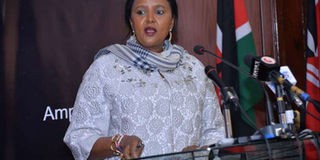Africa is rising, and needs own wings

Foreign Affairs and International Trade Cabinet Secretary Amina Mohamed speaks during a press briefing at KICC in Nairobi on May 30, 2016 on the upcoming Sixth Tokyo International Conference on African Development from August 27 to 29, 2016 in Nairobi. PHOTO | SALATON NJAU | NATION MEDIA GROUP
What you need to know:
- Partnerships are not immune from the asymmetric power relations that produced them in the first place.
- Bilateral engagements are sometimes much easier to navigate, especially if one side has leverage over the other.
- Africa is insisting that whatever global or partnership initiative is put on the table for consideration must be in sync with Africa’s own priorities,
African ministers have just met with their Japanese counterparts in Banjul, The Gambia, to prepare for the sixth Tokyo International Conference on African Development, which will be held in Nairobi in August.
Since the 1990s, partnerships have gained prominence in Africa’s development approach as our continent attempts to assert its interests and insert its priorities and perspective into the global agenda.
The partnerships are a double-edged sword for Africa. On the one hand, we leverage them for dialogue for placing our agenda before the partner, including resource mobilisation. On the other, these partnerships are not immune from the asymmetric power relations that produced them in the first place. They can be good for Africa in the same way that they can perpetuate and reproduce Africa’s dependency and junior status in the international system.
No doubt, things have changed, our continent has its eyes wide opened now. One of the first steps in this regard was when African Union member states placed a moratorium on partnerships to stem what was becoming a worrying trend whereby every significant global player wanted to enter into a partnership with Africa.
Many African countries viewed this stampede with suspicion, that Africa was being used to elevate the geopolitical status of certain countries, some of which would be in competition with a regional neighbour.
Another important step was to trim the participation of partners at summits of AU, which until recently were so inundated by partners to the point of overloading summit proceedings.
Africa is also insisting that whatever global or partnership initiative is put on the table for consideration must be in sync with, if not subordinated to, Africa’s own priorities, especially the AU’s 50-year transformation plan, Agenda 2063.
Key questions remain, though, if Africa is to best utilise these partnerships for our collective self-interest.
For starters, the partnership has to be between equals, and not be driven solely by the geopolitical considerations or the interests of the partner. Meetings must be rotated between Africa and the partner, as opposed to the situation where every time meetings have to take place, African heads of state have to always head to the headquarters of the partner.
CONCRETE PROJECTS
All these partnerships have some sort of an action plan to deliver on the promise of the partnership. But this is where the challenge lies. Some of the partnerships have a financing mechanism, with resources placed at the disposal of the continent for concrete projects. Other partnerships, however, place emphasise on “values” espoused by the partner instead of projects.
Sometimes “values” have the smell of the notorious conditionalities. Outcome documents should be negotiated with exceptional skill to avoid forcing paragraphs down the throat of African delegations.
Follow up is key. Some partnerships use the route preferred by the African side of working through the African Union Commission for follow up and coordination. Others resist this, insisting on choosing whom from the African side should sit around the table.
Some partners eschew transfrontier or regional projects in favour of national projects that the partner can negotiate bilaterally with an African country.
Bilateral engagements are sometimes much easier to navigate, especially if one side has leverage over the other.
In the long term, the solution is not in more partnerships, but in more self-reliance on the African side. Partnerships should complement Africa’s own efforts, and not be seen as a panacea to our problems. Africa should own and lead them. They should be aligned to our agenda and priorities. In the medium term, we should find a way to mobilise our own domestic resources to finance our development.
The reality is that these resources that give the partner leverage in the partnership are not always as forthcoming as the generous promise contained in declarations.
Africa must be fully self-reliant, and very soon. We are on the right track. Recently, AU member states bit the bullet and decided to review their annual contribution to the coffers of the union to reduce dependency on partners.
Africa is rising, but it needs its own wings to remain airborne and survive the turbulence of our time. These wings are the outstanding business of the struggle for our complete independence.
The writer is the CEO of the African Peer Review.




